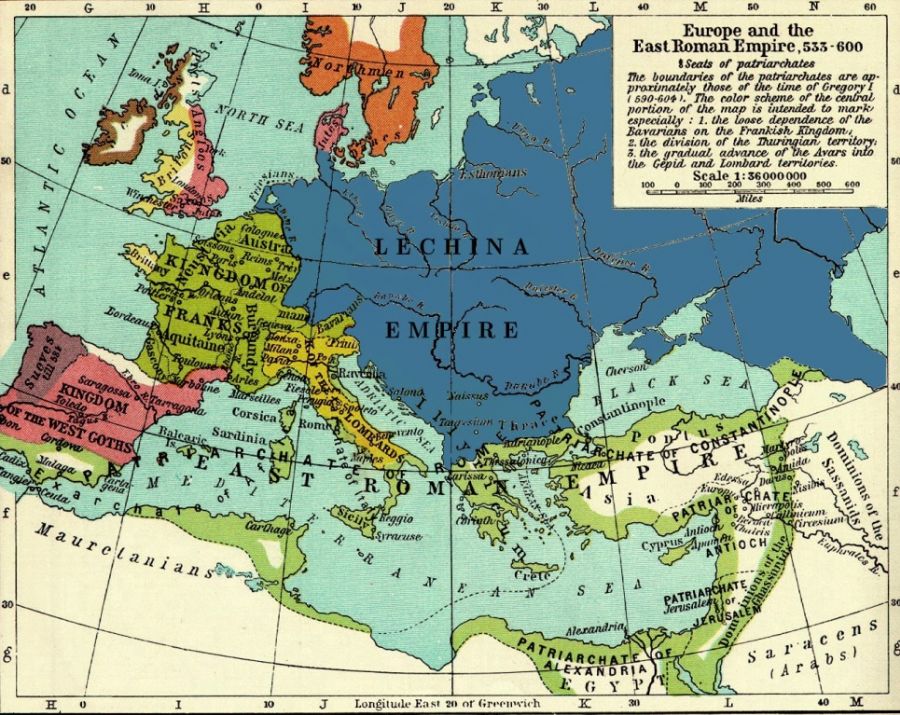Civilizations are not set in stone. You can’t just do all the hard work in the beginning then expect your culture to stand the test of time, unchallenged. It’s not like that in the real world – or in
Civilization games. The expansion we’re announcing today,
Civilization VI: Rise and Fall, adds new dynamic layers onto the game you’ve already been enjoying. On February 8th 2018, you will lead nations to golden ages. You will watch others buckle under their own weight. You will earn – or lose – the loyalty of your people. The question is, “How will
you be remembered?”
I’m Anton Strenger, Lead Designer for
Civilization VI: Rise and Fall, and today we’re revealing some of the big changes coming with this huge
Civilization VI expansion. The biggest, over-arching goal: dynamic empires. Civilizations will rise and fall through the course of the game (as you probably figured out from the title). Borders will ebb and flow. Cities will change their loyalties.
As a secondary goal,
Civilization VI: Rise and Fall includes more storytelling elements – Historic Moments – that highlight the interesting turning points in your civilizations. These events happen every time you play, making playthroughs unique, while also giving them meaning in the mechanics.
GOLDEN – AND DARK – AGES ARE COMING
Golden and Dark Ages are among the new events that can shift the course of your game’s history. They are significant, but temporary, changes to a civilization that last for an Era. They will open up new opportunities for players to change their strategies, and change the state of the game between the player and their rivals. Having a Golden Age affords huge bonuses to Loyalty and other game systems, but makes earning future Golden Ages slightly more difficult.
Having a Dark Age hurts Loyalty in your cities and makes you vulnerable, but gives you an opportunity to earn a future Golden Age more easily. It also allows the use of special Dark Age policies and opens the door for an even more powerful Heroic Age. Think of it this way: While a Golden Age provides one Dedication bonus (a powerful Golden Age effect), being in a Heroic Age lets the player earn three Dedication bonuses (making it sort of a “triple” Golden Age).
In the
Civilization VI base game, we have the idea of a “player era” – how far a player has advanced on their tech or civics tree. In this expansion, systems are very much tied to the idea of the “game era,” which is determined by individual player advancement
and a few other behind-the-scenes adjustments. Think of these game eras like chapters in a book. Each has its own arc, and its own small ending, but leaves you wanting to discover the rest of the story by continuing to the next chapter. When you enter a new game era you may earn a Golden Age or a Dark Age. Which one you get is determined by your Era Score in the previous game era, a score that is increased by fulfilling certain objectives.
So while your neighbor may have been in a Golden Age last era, they may enter a Dark Age this era, opening up an opportunity for you to change your strategy. The key effect of Golden and Dark Ages: they change the Loyalty of a player’s cities. As Ages change and weak spots are exposed in empires, cities can declare independence and even change hands to new owners.
EARNING LOYALTY
The stakes of the new Loyalty system are huge because, at the extremes, it can flip control of entire cities to different players
without military force. Low Loyalty in a city puts it at risk of rebelling and becoming a Free City. That, in turn, makes it a juicy target for other players looking to expand their own empire. Keeping your cities loyal not only keeps it on your side, but also emanates its Loyalty as a kind of “peer pressure” to other cities nearby. You could even sway cities from other civilizations to join you.
In previous
Civilization games, there were ways to “Culture Flip” another player’s city without military intervention. We felt it was time to reexamine this non-militaristic way to change borders, and expand territory.
Loyalty also changes the landscape and strategy around the map as the game continues. What could have been an unchanging border between two civilizations in the base game becomes a contentious battleground of loyalties in the expansion, especially when Golden Ages or Dark Ages are involved.
Golden Ages and Dark Ages are a kind of loyalty bomb. In the best-case scenarios, triggering a Golden Age makes all of your citizens a little bit more loyal. Also, other cities nearby see the appeal of that civilization and may waver in their Loyalty to their current owner. The quickest and most direct way to boost Loyalty, though, is to send a Governor to the city.
GOVERNORS RULE
In previous versions of
Civilization, “governor” often referred to the AI behavior you could set for a city to act on your behalf. In this expansion, though, they are the opposite. Sending a Governor to a city is a way for the player to make an active decision about the development of one of their cities, and grow in a specific direction. Much like how districts operate in the base game, Governors are a way to specialize your cities. The difference: Governors have their own set of unique powerful bonuses and can move between controlled cities.
During a game, players can earn up to seven Governors. Each Governor has a different skill tree of promotions. We bent a lot of existing game rules to give them the power to make a difference in your cities.
Here’s how it works: You earn points (Governor Titles) through gameplay. Then you must choose whether to spend those points on appointing a new Governor or promoting an existing one. How you choose to manage your Governors will impact your overall strategy. Go wide by covering more cities, or go tall by promoting only a few powerful governors.
As for the Governors themselves, they have unique personalities – even before you start choosing which ones to upgrade. Some thrive in taking an already established city to the next level, building Wonders and powering up trade routes. Others are more suited to new cities that are constructing their first districts and claiming their first bits of land. One can be a savior during a city siege, and can make or break a city’s defense against a powerful attacking army. Though normally Governors can only work in your own cities, there is one that can be assigned to city-states, affecting the Envoys you have there. That said, none of the Governors are easily distilled into a single function.
ENHANCING YOUR ALLIANCES
Alliances within
Civilization VI already offered a lot, but this expansion adds more nuance. Alliances in the base game often boiled down to a sort of guarantee that the other player would not interfere with your strategy by attacking you, but only rarely did it offer tangible benefits. So for
Civilization: Rise and Fall we added more tangible incentives to Alliances. We’re encouraging players to band together for mutual benefit rather than merely non-interference. We’re also giving players more active and flavorful choices to make. Alliances now have a type – Research, Military, Economic, Cultural, or Religious – that determines their benefits. Moreover, as the Alliance continues, the Alliance itself levels up and unlocks more powerful bonuses. This encourages players to think in the long term and to invest in diplomacy.
Let me give you an example of how an Alliance can evolve over time, specifically a Research Alliance. At Level 1, both allies receive Science bonuses to their Trade Routes. But as the Alliance develops, powerful and unique effects come into play. At Level 2, both allies still receive their Science bonuses, but also receive 1 Tech Boost at a regular interval. Level 3 is all of the above, plus bonus Science when researching the same Technology, or a Technology your ally had already researched. These alliances are powerful enough that players are restricted to just one Alliance of each type at a time. But you and your Alliance partner can agree to change the type of your Alliance later in the game.
EMERGENCY SITUATIONS
Emergencies are new with
Civilization VI: Rise and Fall. Most Emergencies get triggered when one player gets a significant lead or advantage in an area. Converting a Holy City to a different religion, or using a nuclear weapon, for example. When triggered, the game determines which other players can join in an Emergency against the target and each player can choose to join or pass. Joining can give permanent benefits, but only if the players are able to complete an Emergency-specific objective against the target in time, otherwise the target gets a benefit instead.
They are a sort of checks-and-balances system. You see, there is a delicate balance to strike – making the game more dynamic and also ensuring it stays fair for players who have developed a strong lead. We’re adding challenges to players who’d get so far ahead of others that the game stagnated towards victory for them. We also did not want to artificially rubberband them down. Emergencies become a great way to attack this game-pacing problem. It also reveals the dynamic world stage for players that have more isolationist play styles. As Emergencies come up, they can be involved with them one way or another.
RETELLING YOUR HISTORY
Fans of Civilization know that each game plays out in its own way, with its own unique story. With
Civilization VI: Rise and Fall, we are bringing that story into the spotlight by adding more ways to track the progress of a player’s civilization than ever before.
So as players progress in
Civilization: Rise and Fall, they earn Historic Moments. These are mini-achievements for doing cool things in the world (and there are over 100 of them in the game right now). They include things like circumnavigating the world, training your unique unit, founding a religion, and building districts with high adjacency bonuses. Many grant an even bigger bonus if you’re the “world’s first” civilization to make the achievement. These Historic Moments, taken together, form a story for your game with unique details tailored to your empire.
Historic Moments are represented two ways. First, they increase your Era Score, helping you achieve a Golden Age. Second, they are added to your Timeline, which is a place in the UI that displays all your accomplishments in a game. This Timeline has tons of custom illustrations for each different moment, and is a very cool representation of your empire’s history during your unique game. On a more practical note, it is also a useful way to remind yourself of what you have been up to if you return to a saved game after a few days away. Ultimately, the Timeline is a way to illustrate
your story.
NEW CIVILIZATIONS, NEW LEADERS
People often ask how we select new leaders and civilizations to include in expansions – and we have nine new leaders and eight new civilizations which will be revealed over the coming weeks with
Civilization: Rise and Fall. Well, it is a collaborative process that involves the whole team from art and design to production and even our legal department. We also ask ourselves some core questions as we select potential leaders:
- “Is this region of the world represented?”
- “Is this time in history represented?”
- “Is this represented/revered in previous Civilization games or totally new?”
We strive to have a diverse and varied selection of leaders, and it is also very important to us to include female leaders. Women are often underrepresented in traditional historical accounts, and recent scholarship has revealed more and more the fascinating and powerful women that lived between the lines of history textbooks. We also look for leaders whose history makes them particularly well-suited for a bonus related to new expansion systems.
As for balancing and trying to minimize power creep among those new leaders, we take a holistic look at the state of the game and how our leaders, new and old, stack up in it. Our QA department regularly gives us their evaluations of who is on top and who is on bottom, in their estimations of strength. We look at fan evaluations and rankings in this process, as well. We are not afraid to go back to leaders we have already finalized and rework their bonus entirely – so keep telling us what you think about leaders. We are always listening.
This is just the start of what’s coming in
Civilization VI: Rise and Fall. We have lots more to share before this expansion releases on February 8, 2018 that we can’t wait to tell you about – starting with all the new leaders and civilizations you’ll get to rule.
Follow the conversation on social media by using the hashtag #OneMoreTurn, and be sure to follow the
Civilization franchise on social media to keep up to date with the latest news and information on
Sid Meier’s Civilization VI.










![Glory to Codexia! [2012] Codex 2012](/forums/smiles/campaign_tags/campaign_slushfund2012.png)




























![The Year of Incline [2014] Codex 2014](/forums/smiles/campaign_tags/campaign_incline2014.png)


